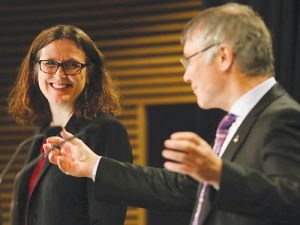Damien O’Connor: NZ united on global trade
When it comes to international trade, politicians from all sides of the aisle are united, says Labour's trade spokesman Damien O'Connor.
 EU Trade Commissioner Cecilia Malmstrom and NZ Trade Minister David Parker address the media following the beginning of negotiations on a free trade deal between NZ and the EU in Wellington earlier this month. Photo: Alphapix / John Cowpland
EU Trade Commissioner Cecilia Malmstrom and NZ Trade Minister David Parker address the media following the beginning of negotiations on a free trade deal between NZ and the EU in Wellington earlier this month. Photo: Alphapix / John Cowpland
A 50% increase in trade, higher wages for New Zealanders and cuts in tariffs to benefit our producers.
These and other options were floated when the European Union’s Trade Commissioner, Cecilia Malmstrom, and NZ Trade Minister David Parker met in Wellington last week to formally start negotiations for a free trade agreement (FTA).
They and their respective officials met briefly at Parliament to start the talks, a long time in the making. They come as NZ’s traditional ally in the EU, Britain, works on its (messy) exit from the EU.
Both Malmstrom and Parker expressed delight that the talks are underway and waxed lyrical about what an FTA could do for both parties. Their chemistry seemed good and Malmstrom appeared relaxed and genuinely friendly towards NZ; and the officials negotiating the deal know each other well.
No surprises are expected in these talks, but there will be challenges. Two-way trade between the EU and NZ is worth $16 billion and the talk was of a natural partnership and historic values shared by both jurisdictions.
Parker says a successful FTA will raise the prosperity of both NZ and EU, with benefits for all.
“We are interested in trade that benefits all and we are determined to push the benefits of those down to small businesses by reducing their barriers to trade. We also want to encourage more women-owned businesses into trade and encourage our burgeoning indigenous economy to grow,” he says.
Malmstrom described the talks as opening a new chapter in economic possibilities for companies and giving choices to consumers, as well also deepening the strategic ties.
She says NZ is a friend and an ally and that it, along with the EU, stood for common values as expressed in sustainable trade and done in compliance with international trade rules.
“We already do trade with each other, but we will try and facilitate that even further and build this relationship; so as to create more jobs and widen consumer choice.
“We have the opportunities to set ambitious rules to facilitate trade. Trade is about tariffs but also [requires] dealing with obstacles, red-tape, bureaucracy, difficult procedures to get certificates and licences.”
Malmstrom says she’s looking forward to the discussions and thinks if the negotiations are successful it will produce a blueprint for FTAs that will inspire other nations to do the same.
Parker agrees, saying that a good NZ/EU FTA would not only benefit both jurisdictions but also make the world a better place.
The first detailed round of negotiations is due to take place in Brussels next month, followed by a further round in Wellington later in the year.
Legal controls on the movement of fruits and vegetables are now in place in Auckland’s Mt Roskill suburb, says Biosecurity New Zealand Commissioner North Mike Inglis.
Arable growers worried that some weeds in their crops may have developed herbicide resistance can now get the suspected plants tested for free.
Fruit growers and exporters are worried following the discovery of a male Queensland fruit fly in Auckland this week.
Dairy prices have jumped in the overnight Global Dairy Trade (GDT) auction, breaking a five-month negative streak.
Alliance Group chief executive Willie Wiese is leaving the company after three years in the role.
A booklet produced in 2025 by the Rotoiti 15 trust, Department of Conservation and Scion – now part of the Bioeconomy Science Institute – aims to help people identify insect pests and diseases.

OPINION: The release of the Natural Environment Bill and Planning Bill to replace the Resource Management Act is a red-letter day…
OPINION: Federated Farmers has launched a new campaign, swapping ‘The Twelve Days of Christmas’ for ‘The Twelve Pests of Christmas’ to…